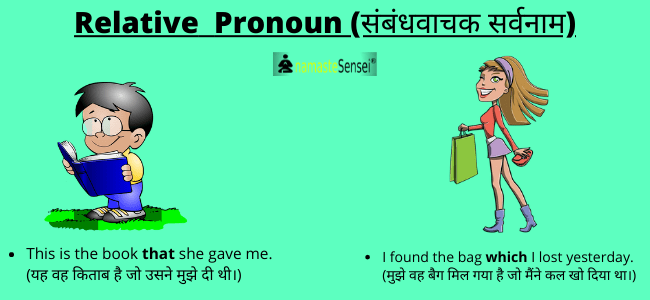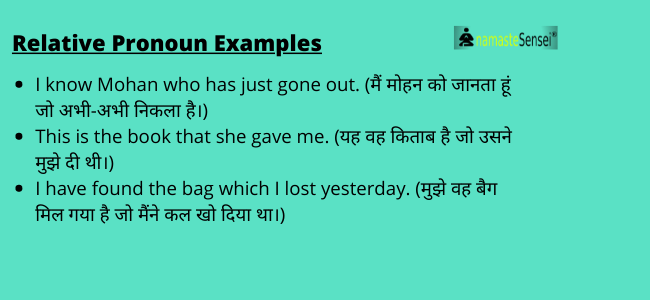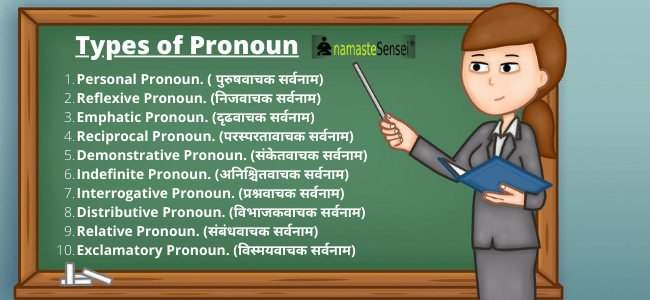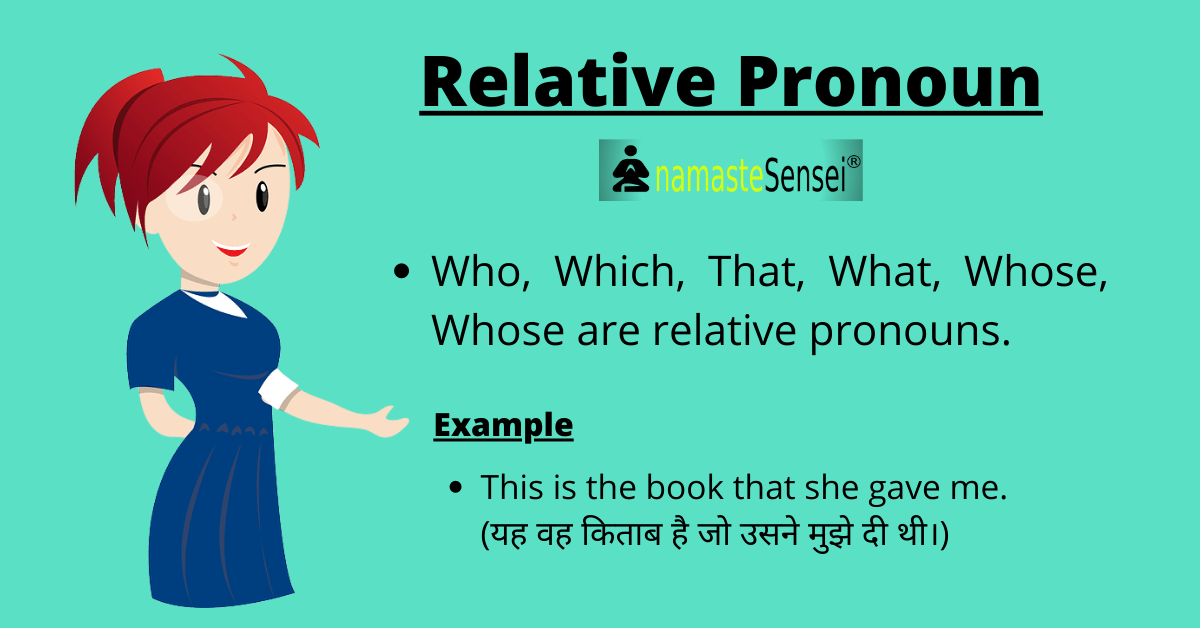Advertisements
Relative Pronoun In Hindi (संबंधवाचक सर्वनाम)

Definition of relative Pronoun
Relative Pronoun in Hindi
- Who, Which, That, What, Whose, Whose are relative pronouns.
Who, Which, That, What, Whose, Whose संबंधवाचक सर्वनाम है।
- Relative Pronoun refers to the noun which comes before them.
संबंधवाचक सर्वनाम से उनके सामने आने वाली संज्ञा का बोध होता है। - Such nouns which come before the relative pronoun are antecedents of the relative pronoun.
ऐसी संज्ञाएं संबंधवाचक सर्वनाम के पूर्ववृत्त कहलाते है।
EXAMPLE – उदाहरण
| I know Mohan who has just gone out. | मैं मोहन को जानता हूं जो अभी-अभी निकला है। |
- In the above sentence who is the relative pronoun that refers to the noun “Mohan”.
उपरोक्त वाक्य में who संबंधवाचक सर्वनाम है।जो संज्ञा “मोहन” को संदर्भित करता है। - Mohan is the antecedent of the relative pronoun “who”
मोहन संबंधवाचक सर्वनाम “who” का antecedent है।
Pronoun and antecedent
सर्वनाम और पूर्ववृत्त
-
What is the antecedent?
- The word that the pronoun replaces is called its antecedent.
जिस शब्द के स्थान पर सर्वनाम आ जाता है, वह उसका पूर्ववृत्त कहलाता है।
EXAMPLE (उदाहरण)
| Rohan saw Sneha and thanked her. | रोहन ने स्नेहा को देखा और उसे धन्यवाद दिया। |
In the above sentence
- “Sneha” is a noun.
- “Her” is a pronoun.
- Sneha which is a noun is being replaced by the pronoun her. Therefore, Sneha is the antecedent of her.
स्नेहा जो एक संज्ञा है उसे सर्वनाम द्वारा प्रतिस्थापित किया जा रहा है। इसलिए स्नेहा उनकी पूर्ववर्ती हैं।
- It is not necessary that all pronouns will refer to an antecedent.
यह आवश्यक नहीं है कि सभी सर्वनाम पूर्ववृत्त का ही उल्लेख करें।
EXAMPLE
उदाहरण
Advertisements
| Everyone here earns over a thousand dollars a day. | यहां सभी एक दिन में एक हजार डॉलर से ज्यादा कमाता है। |
Advertisements
- The word ‘everyone’ (pronoun) has no antecedent.
‘सभी‘ (सर्वनाम) शब्द का कोई पूर्ववृत्त नहीं है।
Example of Relative Pronoun in Hindi
संबंधवाचक सर्वनाम के उदाहरण

- I know Mohan who has just gone out.
मैं मोहन को जानता हूं जो अभी–अभी निकला है। - This is the book that she gave me.
यह वह किताब है जो उसने मुझे दी थी। - I have found the bag which I lost yesterday.
मुझे वह बैग मिल गया है जो मैंने कल खो दिया था।
- In the above sentences Mohan, Book, and Bag are antecedents of relative pronouns who, that, and which.
उपरोक्त वाक्यों में मोहन, पुस्तक और थैला संबंधवाचक सर्वनाम who, that and which के antecedents है।
Types of Pronouns(सर्वनाम के प्रकार)

Types
- Personal Pronoun.
पुरुषवाचक सर्वनाम - Reflexive Pronoun.
निजवाचक सर्वनाम - Emphatic Pronoun.
दृढवाचक सर्वनाम - Reciprocal Pronoun.
परस्परतावाचक सर्वनाम - Demonstrative Pronoun.
संकेतवाचक सर्वनाम - Indefinite Pronoun.
अनिश्चितवाचक सर्वनाम - Interrogative Pronoun.
प्रश्नवाचक सर्वनाम - Distributive Pronoun.
विभाजकवाचक सर्वनाम - Relative Pronoun.
संबंधवाचक सर्वनाम - Exclamatory Pronoun.
विस्मयवाचक सर्वनाम
Recommended Read – Types of Pronoun in Hindi and English.
बधाई हो, आपने पूरा लेख पढ़ा। यदि आपके कोई संदेह या प्रश्न हैं, तो बेझिझक नीचे टिप्पणी करें। हम जितनी जल्दी हो सकेगा संपर्क करेंगे।
या हमें ईमेल करें
अधिक लेख:
Any topic you want us to cover. Let us know.
